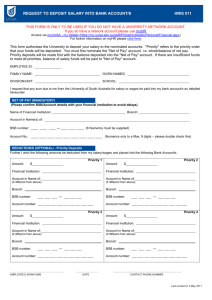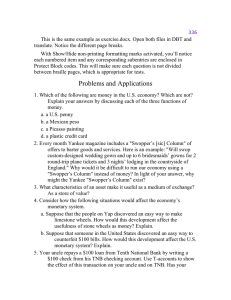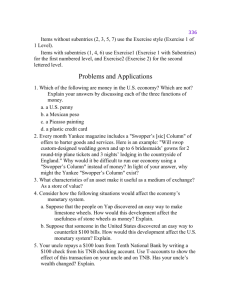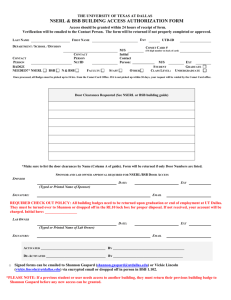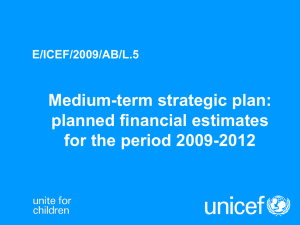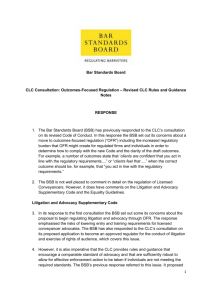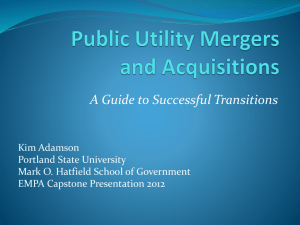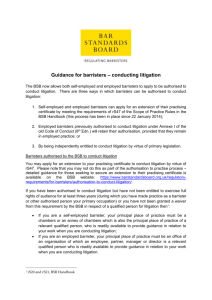Ewen Macleod`s slides
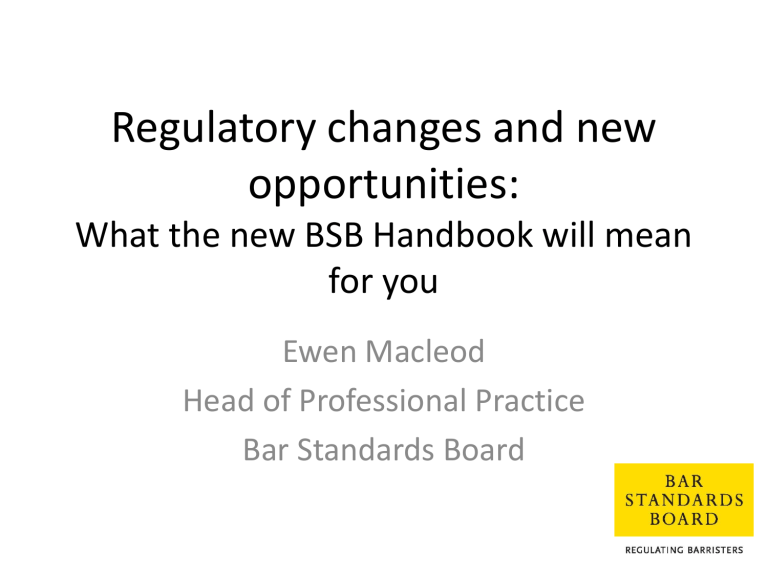
Regulatory changes and new opportunities:
What the new BSB Handbook will mean for you
Ewen Macleod
Head of Professional Practice
Bar Standards Board
Overview
• New structure and approach
• Key changes in new Code of Conduct
• Key enforcement changes
• New approach to supervision
• Entity regulation
• Next steps
BSB Handbook
– Introduction
– Code of conduct
• You and the Court
• Behaving ethically
• You and your client
• You and your regulator
• You and your practice
– Scope of practice, authorisation and licensing
– Qualifications (yet to be reviewed)
– Enforcement
– Definitions
The Code of Conduct
• 10 core duties
– Core elements of professional conduct that apply to all barristers
(and others)
• Outcomes
– Descriptive, rationale for rules and aid understanding of rules and guidance; not mandatory but will be taken into account when considering breaches of the rules
• Rules
– Supplementing core duties where specific rules necessary
• Guidance
– Assists in the interpretation of rules, examples of expected behaviour etc (not mandatory)
The Core Duties
• You must observe your duty to the court in the administration of justice
[CD1]
• You must act in the best interests of each client [CD2]
• You must act with honesty and integrity [CD3]
• You must maintain your independence [CD4]
• You must not behave in a way which is likely to diminish the trust and
confidence which the public places in you or in the profession [CD5]
• You must keep the affairs of each client confidential [CD6]
• You must provide a competent standard of work and service to each client [CD7]
• You must not discriminate unlawfully against any person [CD8]
• You must be open and co-operative with your regulators [CD9]
• You must take reasonable steps to manage your business, or carry out your role within your business, competently and in such a way as to achieve compliance with your legal and regulatory objectives [CD10]
Some key changes
• All core duties to apply to unregistered barristers when providing legal services
– Trust and confidence and co-operation with regulators apply at all times
– Also need to provide information to clients
• Associations and premise sharing
– generally relaxed; but novel business arrangements can’t circumvent the regulatory requirement / outcome and especially not confuse clients
• Reporting certain matters to the BSB:
– includes serious misconduct by self and others
– Exemption for barristers working on Ethical Helpline
• Chambers admin:
– Appoint someone to liaise with BSB
– Members to take (reasonable) personal responsibility
– No appointment of person disqualified by BSB
– Requirement to have risk management arrangements in place
• Option to apply for authorisation to conduct litigation
Further areas of clarification
• Referral fees
• Not misleading clients
• Accepting and return of instructions
• Non-discrimination and cab-rank rules
• Ceasing to practice
• Client money
• Insurance
Enforcement changes
• Admin sanctions available for breach of any rule
– Power to impose rests with PCC (can be delegated to staff)
– Max fine increased to £1,000 for individuals
• ‘Professional misconduct’ will be a breach not appropriate for NFA or admin sanctions and referred to a disciplinary tribunal
• New enforcement policy
Enforcement changes
• Disqualification powers:
– Where breach caused and in public interest to prevent them working for a BSB regulated person
– Requirement to seek BSB approval before employment
– Only DT (or interim panel) could impose
– May apply to us to have it lifted
• Interim suspension and disqualification panels:
– PCC’s powers enhanced
– Triggers for referral and powers available widened
– Immediate interim suspension powers
Supervision
• Recently consulted on proposals for risk-based approach to supervision;
• Whilst the current focus is on Chambers/entities – risk based supervision extends to other areas of regulation – CPD, QA of education providers;
• All supervision of the practising Bar consolidated within single department;
• Risk assessment framework will be a fundamental tool in determining supervision priorities;
• Key part of proposals to become an entity regulator;
• On-going supervision of all sets of chambers and new entities
(rather than one off spot checks);
• Consideration of evidence from wide range of sources (all BSB departments, LeO and specific evidence gathering);
Supervision cont.
• Greater priority given to higher risk sets of chambers or higher risk areas through thematic reviews;
• Supervision v enforcement – a focus on early, constructive engagement rather than punishment;
• Only persistent or very serious non-compliance referred for enforcement;
• Supervision to be available for individuals instead of, or following, enforcement action.
Regulation of entities
• BSB will regulate entities where generally: o The services are the same as those permitted to be provided by the self-employed Bar under BSB regulation (option to include litigation) o All owners with material interest are also active managers of the entity (managers / owners must be natural persons) o A majority of an entity’s managers are entitled to practise as advocates with higher rights (but need not all be barristers) o Restrictions on non-lawyer owners and management (ABS only) o Discretion over the application of these principles, subject to risk assessment
• Aim is to be low risk and draw on the capacity and capability of the BSB; and
• Be flexible in adapting to changes in the market
Regulation of entities (2)
• New Handbook proposes new duties for managers of entities and authorised persons who work in them (rules similar to those for self-employed barristers)
• Cab rank rule to apply in a similar way as to individuals
(named advocates)
• Specific HOLP and HOFA duties
• Duty to ensure all employees do nothing that causes or contributes to a breach of the Handbook
Next steps
• LSB considering Handbook application for individuals (decision due early July)
• Next application (non-ABS entities) submitted following that decision – decision due Sept?
• Both due to go live January 2014
• ‘Licensing authority’ application submitted after entity decision (aim to regulate ABSs in
2014)
